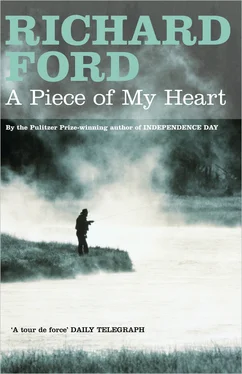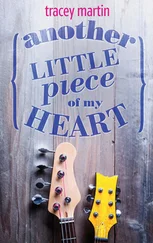Richard Ford - A Piece of My Heart
Здесь есть возможность читать онлайн «Richard Ford - A Piece of My Heart» весь текст электронной книги совершенно бесплатно (целиком полную версию без сокращений). В некоторых случаях можно слушать аудио, скачать через торрент в формате fb2 и присутствует краткое содержание. Год выпуска: 1976, Издательство: Bloomsbury Publishing, Жанр: Современная проза, на английском языке. Описание произведения, (предисловие) а так же отзывы посетителей доступны на портале библиотеки ЛибКат.
- Название:A Piece of My Heart
- Автор:
- Издательство:Bloomsbury Publishing
- Жанр:
- Год:1976
- ISBN:нет данных
- Рейтинг книги:3 / 5. Голосов: 1
-
Избранное:Добавить в избранное
- Отзывы:
-
Ваша оценка:
- 60
- 1
- 2
- 3
- 4
- 5
A Piece of My Heart: краткое содержание, описание и аннотация
Предлагаем к чтению аннотацию, описание, краткое содержание или предисловие (зависит от того, что написал сам автор книги «A Piece of My Heart»). Если вы не нашли необходимую информацию о книге — напишите в комментариях, мы постараемся отыскать её.
A Piece of My Heart — читать онлайн бесплатно полную книгу (весь текст) целиком
Ниже представлен текст книги, разбитый по страницам. Система сохранения места последней прочитанной страницы, позволяет с удобством читать онлайн бесплатно книгу «A Piece of My Heart», без необходимости каждый раз заново искать на чём Вы остановились. Поставьте закладку, и сможете в любой момент перейти на страницу, на которой закончили чтение.
Интервал:
Закладка:
Richard Ford
A Piece of My Heart
Kristina
I am grateful to the University of Michigan Society of Fellows, who supported me generously while I wrote this book.
R.F.Prologue
W.W. came down over the levee in the rain, his old Plymouth skidding out of the ruts and his gun barrel pointed wildly out the window, still warm from being shot. He looked down on the boat camp through the willows and for a moment saw nothing but the house and the dock shielded in the rain, though he had watched from a distance as Robard's truck had topped the levee three minutes ago and disappeared over the side, and had come on after him. He drove more slowly through the willows as the rain began to let go harder. Fat droplets plowed down the rifle barrel and dripped on his pants, though he didn't notice. He saw Robard's truck finally, sitting down in the cover of the low limbs, steaming and ticking in the rain. He left the car, left it rolling until it rolled into the back of the truck, and stepped cautiously toward the dock, still in his baseball uniform, where a blond boy was standing over the water with a rifle held barrel-to-toe, watching an empty boat drift down the lake corridor toward the shallows.
When the boy sensed the presence of someone else, he whirled and threw up his rifle and pointed it squarely into his belly.
“Now who the hell are you?” he said, the corners of his mouth quivering so that he seemed to want to smile.
W.W. looked out on the water, fingered the warm trigger guard, and wondered if he could shoot the boy and somehow in the scrap avoid being shot himself. He decided he could not, and smiled.
“I’m W. W. Justice from Helena.”
“What are you doing in your baseball uniform and totin a rifle, W.W.?” the boy said, displaying the absence of three front teeth, behind which could be seen his tongue at work trying to fill up the space.
“I come after Robard Hewes. I guess you hadn’t seen him.”
“Come who?”
“Robard Hewes.”
“Well, W.W.,” the boy said, flicking the corners of his mouth with his tongue and letting the tip of his rifle sink back to his foot, “I never did hear of him. But I’ll tell you one thing.”
“And what’s that?” W.W. said.
“I just did kill a man here, wasn’t a minute past you drivin up.”
“Who’d you kill?” he said, watching the empty boat dawdling in the rain breeze.
“Damned if I know. Whoever it was, though, didn’t have no business being here. I’ll tell you that. I’ll tell you that right now.”
Part I. Robard Hewes
1
In the dark he could see the long tubular lights nose down the mountain toward Bishop. They crossed the desert after dark, leaving Reno at dusk and slipping across the desert at midnight toward Indio. He sat in the front room in the dark and stared through the doorway, smoking and listening to the beetles swarm the screen and the air sift through the window. Someplace away a cab-over ground down and started across the meadow to the mountains. In town he could hear a car horn blowing a long time and tires squealing, and then it faded and sank back into the night. He breathed a plume of smoke in the dark and ran his fingers through his hair.
“So,” she had said, “how long will you be gone?” setting the dishes on the window sill and staring out into the purple light. “What’s it going to be like?”
“It’ll be all right,” he said. “I’ll be back.”
And she had turned, her thick hair over her shoulders, blacker than his, and disappeared into the house without another word. As if she had just caught herself being lured into an arrangement and had drawn back to save herself on an instinct she had forgotten existed, since for eight years there hadn’t been a reason to save herself. He had listened to the door shut.
In a while he had gotten up from the table and switched off the bulb and gone to wait until it was good dark and he could leave in the cool.
He wondered, sitting alone there, just what you do. When your husband up and just steps out of the life you have with him, after living eight years cultivating a dependence that he won’t suddenly up and drive away into the night without saying why, what do you do? What alterations can you make? He felt he would have to settle with whatever adjusting she had done, when he came back. He tried to think of some other way, and decided there wasn’t one.
He blew smoke in the darkness. A car came along the dirt road, its headlights tracking the shoulder, the radio playing so that it sounded very close to the house. The car reached the end of the road, turned back into the desert, and the music floated away.
At nine o’clock he walked to the back of the house, switched on the bulb, filled the kettle, and set it back on the flame. The kitchen smelled cold, though it was warmer than in the other rooms. The stove smelled of gas. He rinsed the Thermos and set it upside down on the sink. He took down the powdered coffee and sat at the table and waited.
He remembered sitting in the little two-room warming house in Hazen, waiting at the table for the doctors to come from Memphis. He had rinsed the mugs, set them in a line on the wood counter, each with a spoon, set down the tin of powdered coffee, and begun waiting for shooting time, warmed by the gas ring and the bulb light shining at the corners, bending shadows into the back room where the cot was. He waited in the cold until the doctors came down the car path, their heavy cars swaying and rocking, throwing their high beams across the field to the corner of the woods, where he could see through the half-glass door, red cinder eyes flashing and disappearing into the trees.
He had waited at the window until they came inside, old men in long wading boots and canvas coats, and took the pan off the stove and made the coffee while the men’s voices filled the room, laughing and coughing until it was warm, and he had slipped away to wait on the cot until he could see the window whiten and the first silver haze behind the treetops, and herded the men across the field in the stillness toward the timber so that the cabin sank and became just a single light and finally disappeared in the burnt flakes of sunlight. In the cold the men grew silent and morose like lumps of soft coal, plodding into the trees, their boots squeezing together, until the ground gave way to water. He had set them in the boats and waded down into the flood, towing them through the trees until he could hear the ducks squabbling and conniving a hundred yards farther in the deep water. High up he could see their imprint trading cleanly on the pale sky. He set the men out there, held the boats while they stumbled out into the thigh-high water, spoke the directions they ought not go, toward the channel of the creek, then left them wading noisily through the water, laughing in the shadows, until he could not hear them and had towed the boat back to the ground.
He had gone back then across the field to the house and waited, dozing under the light, until the morning had grown up bright and glassy. Then he walked back across the bean rows to the boats, where he would find one of them, always one, returned, lolling in the shallows, asleep and blue-lipped, a strand of yellow hair across his temple, asleep before light had ever come. He towed him sleeping back into the timber, through the black water to where the others were shouting and roiling the water and shooting, to where the ducks were down and bleeding on the lilting surface, swimming in circles among the trees.
He had waited there in that shack for the doctors to come from Memphis, or the fish salesmen to drive from Gulfport and Pass Christian, or the Jews from Port Arthur, driving all night through Louisiana and arriving before light, puking in the muddy yard, and bellowing in the night. He had waited there mornings, thinking of nothing, waiting for whomever old Rudolph took money from (a thousand dollars a head) and sent out, rinsing their spoons and sliding away noiselessly out of the light into the cold back room, waiting to take them in for the ducks.
Читать дальшеИнтервал:
Закладка:
Похожие книги на «A Piece of My Heart»
Представляем Вашему вниманию похожие книги на «A Piece of My Heart» списком для выбора. Мы отобрали схожую по названию и смыслу литературу в надежде предоставить читателям больше вариантов отыскать новые, интересные, ещё непрочитанные произведения.
Обсуждение, отзывы о книге «A Piece of My Heart» и просто собственные мнения читателей. Оставьте ваши комментарии, напишите, что Вы думаете о произведении, его смысле или главных героях. Укажите что конкретно понравилось, а что нет, и почему Вы так считаете.












